- Home
- Robin McKinley
Deerskin
Deerskin Read online
PRAISE FOR THE WRITING OF ROBIN McKINLEY
Rose Daughter
“Every sentence and every occurrence seems infused by magic. I will keep this book. I will reread it, time and again; it has earned its place as one of my odd coterie of bedside companions.” —Fantasy & Science Fiction
“McKinley is at home in a world where magic is a mainstay and, with her passion for roses, she’s grafted a fully dimensional espalier that is a tangled, thorny web of love, loyalty, and storytelling sorcery. Fullest appreciation of Rose Daughter may be at an adult level.” —School Library Journal
“Readers will be enchanted, in the best sense of the word.” —Booklist
Deerskin
“A fierce and beautiful story of rage and compassion, betrayal and loyalty, damage and love … A fairy tale for adults, one you’ll never forget.” —Alice Hoffman, New York Times–bestselling author of At Risk and Seventh Heaven
“I did so much enjoy Robin McKinley’s Deerskin … I respect her writing and reread her constantly, finding new perceptions each time.” —Anne McCaffrey, bestselling author of Damia’s Children
“An enormously powerful novel … Dreamlike, urgent, inexplicable … Robin McKinley has created a world where nightmare and hope exist side by side.”—Patricia A. McKillip, author of The Sorceress and the Cygnet
“A wonderful story, wonderfully told.” —The San Diego Union-Tribune
“Award-winning author McKinley turns her storytelling acumen and stylistic grace toward an adult audience … A classic journey-tale and a parable for modern times.” —Library Journal
“Superlative.” —Booklist
Sunshine
“Pretty much perfect.” —Neil Gaiman
“Sunshine is quite possibly the best vampire book published in my lifetime.” —Melissa Marr, author of the Wicked Lovely series
“The charm of this long venture into magic maturation derives from McKinley’s keen ear and sensitive atmospherics, deft characterizations and clever juxtapositions of reality and the supernatural … McKinley knows very well—and makes her readers believe—that ‘the insides of our own minds are the scariest things there are.’” —Publishers Weekly
“A luminous, entrancing novel with an enthralling pair of characters at its heart.” —Booklist
“Step into Robin McKinley’s thrilling, beautifully described world.” —Jayne Ann Krentz, bestselling author
“A smart, funny tale of suspense and romance.” —San Francisco Chronicle
“Sunshine takes everything we have always known about the menacing eroticism of pale men with sharp teeth, and throws it up into the air.” —Time Out
“McKinley [balances] the dark drama with light touches of humor. Fans of Buffy the Vampire Slayer will feel at home, but McKinley’s novel has its own originality and depth.” —Orlando Sentinel
“A good book with some nice little twists on the magic theme.” —The Kansas City Star
“Well-written and exciting.” —Rocky Mountain News
Deerskin
Robin McKinley
To Mary, Mary, Barbara, Susan, Alex, Steve, Andrea and George: thanks.
PART ONE
ONE
MANY YEARS LATER SHE REMEMBERED HOW HER PARENTS HAD looked to her when she was a small child: her father as tall as a tree, and merry and bright and golden, with her beautiful black-haired mother at his side. She saw them, remembered them, as if she were looking at a painting; they were too splendid to be real, and always they seemed at some little distance from her, from all onlookers. They were always standing close together as she remembered them, often gazing into each other’s eyes, often handclasped, often smiling; and always there was a radiance like sunlight flung around them.
Her mother had been the most beautiful woman in seven kingdoms, and seven kings had each wanted her for himself; but her father had won the priceless prize, even though he had been only a prince then, and his father hale and strong.
When the old king fell from his horse only a year after his son married, and died of the blow, everyone was shocked and surprised, and mourned the old king exceedingly. But he was forgotten soon enough in the brilliance of the young king’s reign, and in the even brighter light of his queen’s beauty. When the worst grief was spent, and such a joke could be made, some people laughed, and said that the most beautiful woman in seven kingdoms had the luck of seven kingdoms as well, for she was now queen of the richest, and for a mere year’s wait.
It was the princess’s nursemaid who told her this story, and told it often. It was the nursemaid’s favorite, and became the little girl’s, the long story containing many stories, of her parents’ courtship and marriage. This story was better than anything read draggingly out of a storybook—for the nursemaid was uneasy with her letters, but as the ability to read was one of the requirements of her post, she was extremely anxious that no one should find this out. She told the princess that there was no need for dull stories out of heavy hard books, and as she made the storybook stories dull and the stories she herself told interesting, the princess came readily to agree, perhaps because her parents were only a little more real to her than the characters in the storybooks.
“Your lovely mother cast her eyes down when her new people said such things to her, for she was a modest girl then as she is a modest woman now; but everyone knew that she would have chosen your father over the other six kings even had he been a goat-boy with naught but a bell and a shepherd’s stick to his name.”
“Tell me about the task he was set,” said the little princess.
“Ah, it was a terrible task,” said the nursemaid, cuddling her close on her lap. “Each of the seven kings—six kings and one prince—was given a task, and each task was more difficult than the one before, as your lovely mother’s father began to comprehend the setting of tasks; for such a joy was the daily presence of your lovely mother that her father was not eager to part with her. And so he looked to drive her suitors away, or to lose them on topless mountains and in bottomless valleys or upon endless seas. But who could blame him? For she is the most beautiful woman in seven kingdoms, and he died of a broken heart eight months after she married your father and left him, and even your uncle, who is now lord of those lands, says the country, the earth itself, is sad without her.”
“The task,” said the princess.
“I was coming to it,” said the nursemaid reprovingly. “So your father was the seventh suitor after the six kings, because his father thought he was young to marry, and had heard besides that your lovely mother’s father was setting such tasks that might lose him his only son. But in the end he did his son no favors, for his son—your father—would go, and so it was he who had the last and hardest task.”
“And what was it?” said the princess, though she had heard this story many times.
“I am coming to it. The task was to bring a leaf plucked and unfallen from the tree of joy, which grows at the farthest eastern edge of the world, and an apple plucked and unfallen from the tree of sorrow, that grows at the farthest western end of the world.
“And when your lovely mother’s father said the words of the task, he smiled, for he knew that no living man could accomplish it; and so at worst his daughter had but six suitors left.
“But he did not see the look that passed between his daughter and her seventh suitor; the look that said, I will do this thing, and was answered, I know you will, and I will wait for you.
“And wait she did; four of the six kings returned successfully from their adventures, bearing what they had been ordered to bring. The word came that the fifth king had been killed, and that the sixth had thought better of his third cousin twice removed, and went home and married her—and I’ve always heard that they’re very happy,” the nursemaid add
ed, doubtfully, to herself. “And she such a plain girl, with a heavy jaw and thick legs. They all say she’s kind, and loves her husband, but if you’re king ’twould be easy to find plain girls with thick legs to love you, a penny the dozen, and any such who was made queen would be sure to be kind from … from surprise. It would be easy!” said the nursemaid, fiercely, pleating the edge of her apron with her fingers.
The princess fidgeted. “The task!”
The nursemaid started, and smoothed her apron, and put her arm again around the princess. “Oh, yes, my love, his task. So your lovely mother refused to choose among the four kings who had completed their tasks, saying that she would wait for the return of the last, which was only fair.
“The four kings grumbled—particularly since it was only a prince they were waiting for, and his father the king young yet—but your lovely mother’s father smiled and smiled, because he began to suspect that some such a look as had passed between his daughter and her seventh suitor must have done so, and that his daughter waited for some reason other than fairness. He was well pleased, because he knew that no living man could bring back a leaf plucked and unfallen from the tree of joy, as well as an apple plucked and unfallen from the tree of sorrow. It might take a lifetime to do just the one or the other; and then the man who came at last within the shade of either of those great trees, did he once let those branches’ immortal shadows touch him, might lift a sere and curled leaf or a bruised and half-rotted apple from the ground, and think his life well spent to do so much.” The nursemaid was not easy with her letters, but she listened closely to every minstrel who sang in the king’s halls, and she knew how a story should be told.
“So the father of the most beautiful woman in seven kingdoms smiled, for he foresaw that he would not need to set further tasks for the four kings, now sitting at his board, glowering and restless, because his daughter would refuse them all, waiting for the one who never came. And such was the love that he bore for his only daughter, and the desire for her presence, that he did not begrudge the entertainment of those four kings, however long they sat at table, however expensive their serving and stabling.
“But what he did not know was the strength of that look that had passed between the prince and the lady; for the strength between them of wanting and of need was greater than what one mortal man could do in one mortal lifetime. And so it was but a year and a day from your father’s setting out on his quest, not caring that it was a hopeless one so long as he carried the look your mother had given him deep in his heart, that he returned. Because he loved her beyond life itself, and because he knew she loved him equally, he knew he must return; that knowing was greater than time and mortality.
“The old lord’s health began to fail as soon as he set eyes on your father, striding into the court of his beloved’s father, his face alight with happiness and hope; but I doubt your father noticed, for he had eyes only for the raven-haired lady sitting at her father’s side. But everyone else noticed, and everyone remembered that your lovely mother’s father had threatened to set a second task for any suitor she favored, so terribly did he want to keep her.
“But they said that when he saw the strength of the bond between them shining in your father’s face, he did not have the heart to set any more challenges, for the strength of his own love made him recognize what he saw. Certainly he gave them his blessing when they turned to him and asked for it; but he gave it to them in the creaking voice of an old, old man, and when he passed his hands over their heads, the hands were thin and gnarled.”
The princess, who did not care for old people, said, “But what of the leaf and the apple?”
“Ah, that was an amazement among amazing things. They thought the old king would defy this last successful suitor by saying that the leaf and the apple were not what they must be, but any shining leaf and any bright, round apple, for how is anyone to tell if something no mortal hands has touched before be that thing or no? But when your father took his tokens out of his pack and held them up for all to see, a strange blindness struck the company, as if their eyes had for the moment forgotten their work, or fled from the task of seeing. And they were dazed with this, with the betrayal of their own vision, and sank to their knees, and trembled, and did not know what had come to them, and only wished to return to their ordinary lives, and deal no more with marvels.
“But from out of their mazing they heard your father’s laugh, and then there was a burst of flame that everyone saw, like a bonfire at Midsummer, blinding indeed if you look too closely, but a familiar kind of astonishment this was, one you understand and can turn away from. Everyone blinked, and in blinking their vision returned to them; and they looked around. The fire in the great fireplace had gone out; and it and the walls around it were blackened as by some great explosion, and the prince and the lady stood before that blackened hearth, now locked in each other’s arms. And yet they had stood half across the wide court from each other before the blindness struck all those who watched.”
“He had thrown them in the fire, the leaf and the apple,” said the child.
“Aye, that he had,” agreed the nursemaid. “Tokens worth the finest treasure in this world or any other, tokens no living man should be able to bear; and he threw them into the fire for the love of your mother, and felt no regret. For, he said, all the joy he needed was in your mother’s eyes; and he could withstand any sorrow so long as he had once known that joy.”
“And so they were married.”
“Aye, they were married. The four kings came, and danced with your mother, and drank to your father’s health; and went away sadly but politely, for they were all true kings. The successor of the fifth king was twelve years old, but he knew what was expected of him, or had ministers to tell him what to do, and he sent a handsome young lord who brought a golden casket full of pearls as a wedding gift. The sixth king … sent his regrets by herald, with but a second herald to accompany him, and they also brought a gift, a quilt, a patchwork quilt, made by his heavy-jawed queen and her ladies, in shades of blue, embroidered with stars … as well send an ostler with a horse blanket!” The nursemaid sniffed. “It cannot be imagined what your lovely mother’s life could have been, with such a husband.
“The other kings have all since married too, and each of their queens has borne a son, and”—the nursemaid lifted the child off her lap, and gave her a little, intense, gleeful shake—“in twelve or fourteen years, your father will be setting tasks for them!”
The princess fell asleep nights thinking of the tree of joy and the tree of sorrow, and sometimes she dreamed of the sound of leaves rustling, and of the sweet, sharp, poignant smell of ripe apples. And she woke to another day bright with the presence of her parents, for they lit their world as the sun lights the great world, and every one of their subjects loved them and was grateful.
It was a favorite joke among their people that the way to be certain that it did not rain on any fair or harvest was to invite the royal couple to it. The sun himself, it was said, could not resist the queen’s beauty, and loved nothing better than to tease the hidden red fires from deep within her glossy black hair.
There were no wars, nor even threat or thought of war, for the people were all too contented. It was said that any foreign danger, any officer from a rival king, would be so bewitched by the queen that he would charm his own master into renouncing his claim. The queen said nothing to this, neither yea nor nay, but smiled her secret smile, and cast her eyes down, as she had done when she was teased for her luck in her father-in-law’s early death. The queen spoke little, but few words of her were necessary, for the wonder of her presence was enough.
When the king and queen made processions through their kingdom, the princess came too; and people were kind to her. They were kind to her when they noticed her, for all eyes were upon the king and queen, and she was but a child, and small, and shy; and during those early years of her life she worshipped her parents more than anyone, except, perhaps, her nursemaid.
Even her dancing-master, her riding instructor, and her mistress of deportment seemed able to think of teaching her only in terms of the queen’s gifts and graces; and so the princess, who was only a child, thought little of her own talents, because by that standard she could not be said to succeed. And because she was a child, it did not occur to her to wonder why neither her nursemaid, nor her dancing-master, nor her riding instructor, nor her mistress of deportment ever said to her, “My dear, you are but a child yet, and the queen a woman in the fullness of her prime; you stand and step and move very prettily, you take instruction graciously, and I am well content to be your teacher.” Her father and mother never suggested such things to her either; but then they never saw her practice dancing or riding, or sewing or singing. There were always so many other things for so popular a king and so beautiful a queen to do.
On the princess’s twelfth birthday there was a grand party just for her, and all the lords and ladies came, and one of the sons of the once-rival kings, who was thirteen, and stood almost invisible among the tall figures of his guardsmen. There were musicians, and dancing, and talk and laughter, and the banqueting tables were piled high with beautiful savory food, and she could not bear it, that so many eyes should think to turn upon her as the cause of all this magnificence, and she ran and hid in the nursery.
When her old nursemaid found her at last, and washed her face free of tear-stains, and pressed her crumpled dress, and tidied her dark hair, and took her downstairs again, the queen was sitting at the head of the table, in the chair the princess had fled. The king sat at her right hand, and they were feeding each other bits of cake and sweetmeats, looking into each other’s face, utterly absorbed in these things. The thirteen-year-old prince sat near them, watching, his mouth hanging a little agape.

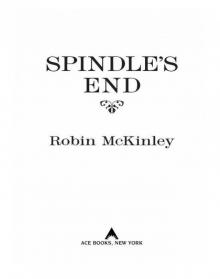 Spindle's End
Spindle's End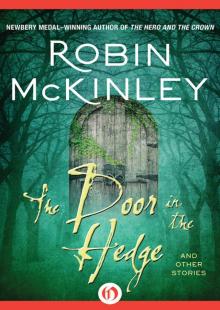 The Door in the Hedge: And Other Stories
The Door in the Hedge: And Other Stories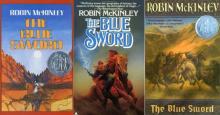 The Blue Sword
The Blue Sword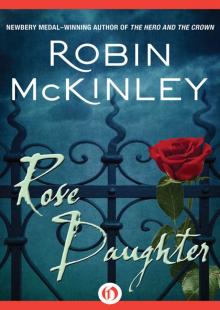 Rose Daughter
Rose Daughter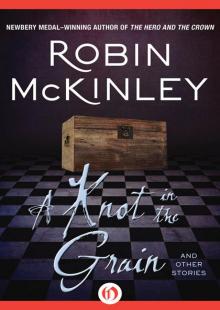 A Knot in the Grain and Other Stories
A Knot in the Grain and Other Stories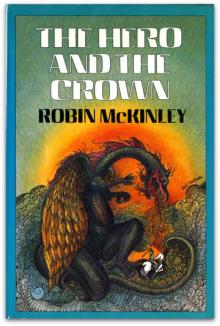 The Hero And The Crown
The Hero And The Crown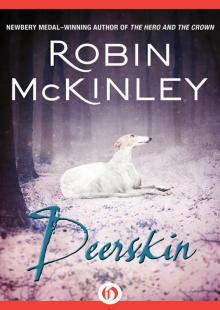 Deerskin
Deerskin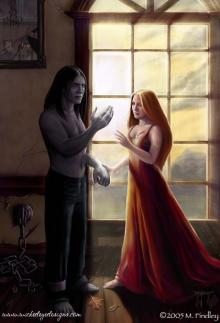 Sunshine
Sunshine Beauty: A Retelling of the Story of Beauty and the Beast
Beauty: A Retelling of the Story of Beauty and the Beast Shadows
Shadows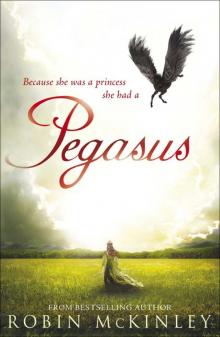 Pegasus
Pegasus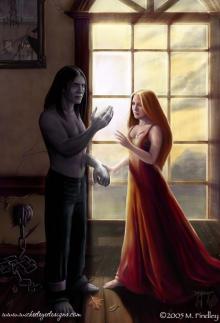 Chalice
Chalice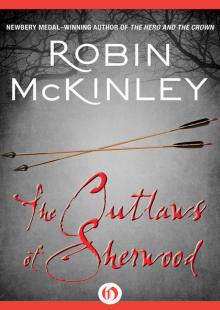 The Outlaws of Sherwood
The Outlaws of Sherwood Fire: Tales of Elemental Spirits
Fire: Tales of Elemental Spirits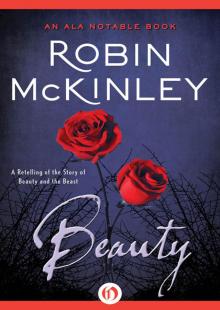 Beauty
Beauty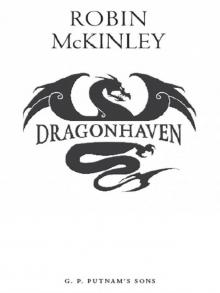 Dragon Haven
Dragon Haven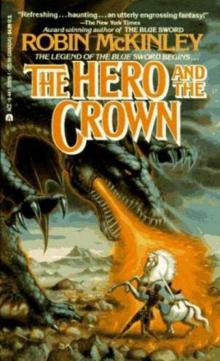 The Hero And The Crown d-2
The Hero And The Crown d-2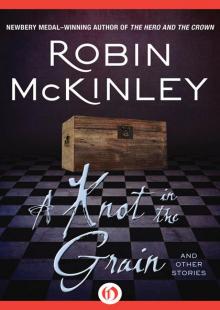 A Knot in the Grain
A Knot in the Grain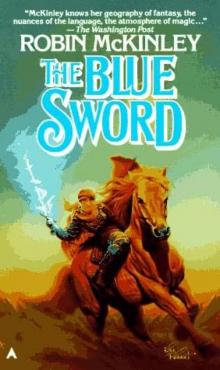 The Blue Sword d-1
The Blue Sword d-1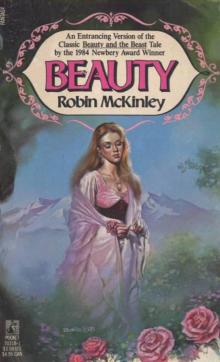 Beauty (v1.2)
Beauty (v1.2)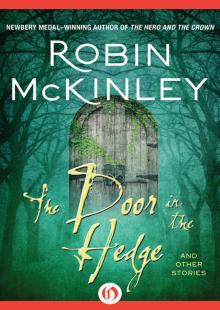 The Door in the Hedge
The Door in the Hedge